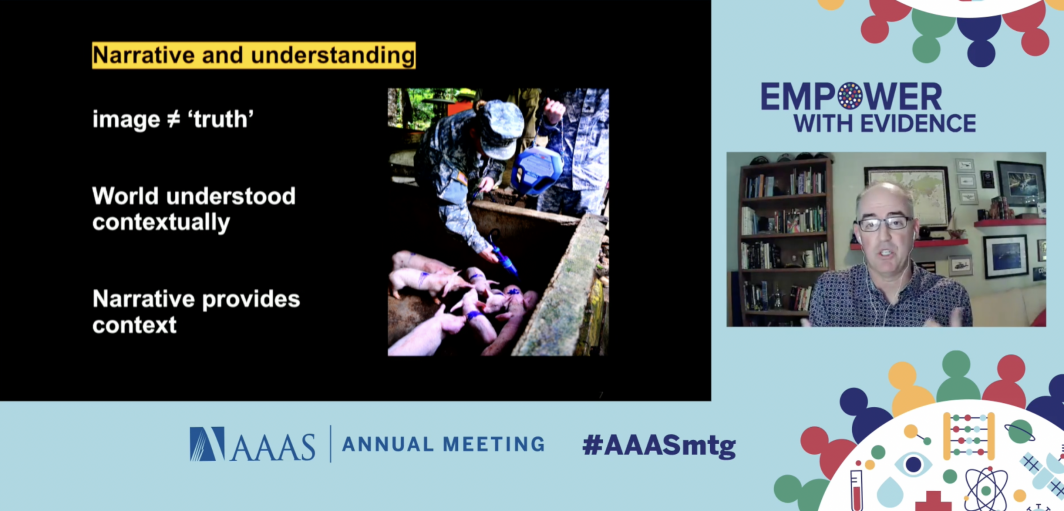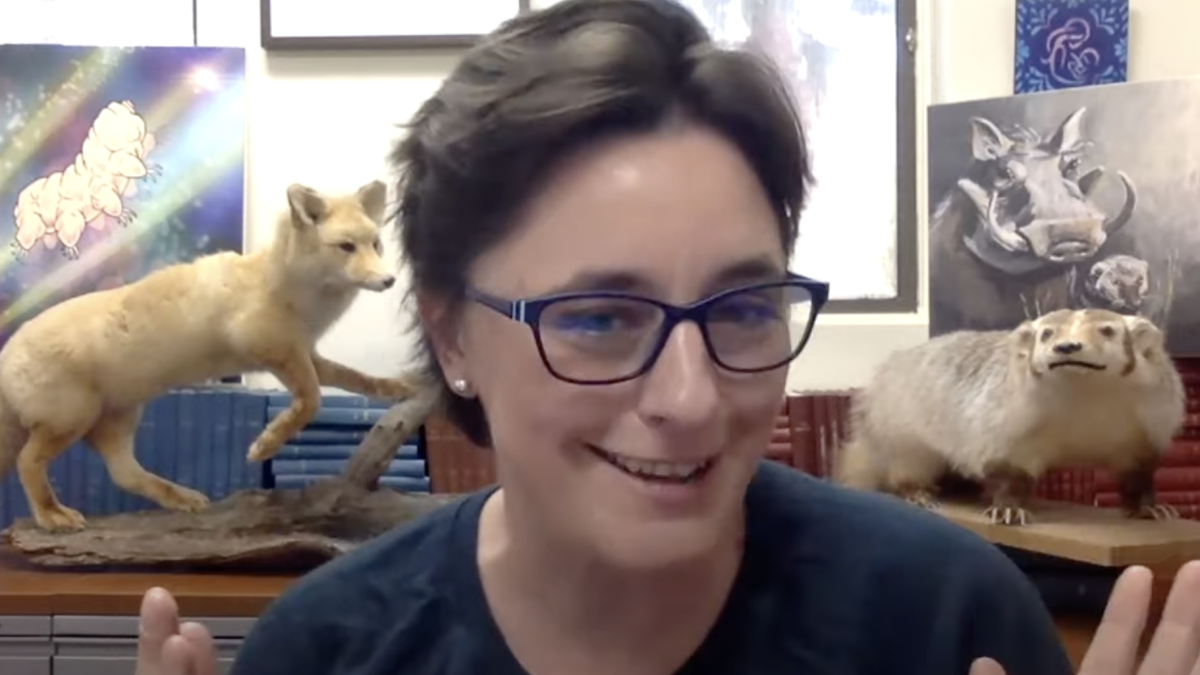With the global SARS-CoV2 pandemic now entering year three, science has remained at the forefront of public awareness and importance.
But despite the omicron variant forcing a move to a virtual environment, Arizona State University researchers were once again in the spotlight at the world’s largest scientific meeting: the annual conference of the American Association for the Advancement of Science (AAAS).
Below were some ASU highlights from the presenters at this year’s AAAS Annual Meeting, themed: “Empower with Evidence.”
A care conundrum at the intersection of class, access and health
How do care networks — parents and extended family — change and affect children with pressures in current society?
Robin Nelson, an associate professor at the School of Human Evolution and Social Change at ASU, explored the care conundrum and her AAAS research presentation.
“My research lies at the intersection of evolutionary questions about the creation and necessity of kin and social networks, and the pressures facing contemporary families as they navigate access to resources and engagement in global labor markets,” Nelson said. “I try to connect issues in evolutionary anthropology and public health to ensure that those of us who are interested in the complexity of the human condition are paying attention to the changing pressures that humans are experiencing right up until the present day."
Nelson, a biocultural anthropologist, has studied the lives of families and children in Jamaica since 2004. Her current projects include research on Black migrants from Africa and the Caribbean who move to Canada, and how they create care networks for their children. She’s also researching the lives of children who have been removed from their primary home and put into care facilities in Jamaica.

Games, stories and science for successful public engagement
A science game called March Mammal Madness has captivated students and the public since its launch almost a decade ago. The game, which involves simulated animal battles played out over social media, has now reached half a million middle and high school students in the United States. Through this game, the students learned fundamental science principles.
MORE: A look inside the 10th Annual March Mammal Madness tournament
Katie Hinde, an associate professor at the School of Human Evolution and Social Change at ASU, is the creator of March Mammal Madness (MMM). Hinde explored successful public engagement in science with MMM in her AAAS discussion.
The anthropologist explained the importance of using stories and narratives for engaging adults and children in science, and how these techniques have been used for thousands of years.
“Stories bring together aspects of the natural world and abstract ideas and allow the scaffolding of new knowledge onto the learner’s existing knowledge. A story is co-constructed back and forth between the listener’s imagination and the storyteller’s narrative in dynamic ways, and different contingencies or events unfold,” Hinde said.
MMM started in 2013 when Hinde did a bracket in one of her labs, then posted it to her blog. She wanted an animal tournament that was based on science. After all, the NCAA’s single elimination basketball tournament invites over five dozen teams. MMM has grown exponentially, with a team of over 30 people, including scientists, scientific illustrators, artists and librarians.
Now through March 14, you can get your bracket, pick your winners and then follow the competition on Twitter, Facebook and the ASU Library results page. To learn how to play, find links to curated resources to help pick your winners, and review highlights from previous years of the tournament, bookmark the library guide at https://libguides.asu.edu/marchmammalmadness.

Developing public interest in technology by engaging with and empowering communities
When it comes to the design and development of socio-technical systems, the public interest isn't always a priority. A human-centered approach that includes input from the public is needed to build sustainable solutions.
"You don't build for the public, you build with them," said Katina Michael, an ASU professor at the School for the Future of Innovation in Society in the College of Global Futures and the School of Computing and Augmented Intelligence in the Ira A. Fulton Schools of Engineering. "You need to acknowledge all stakeholders in the process, because you're designing and delivering solutions together within an existing ecosystem."
Michael is an expert in public interest technology and is researching how to use it as a philosophy for design.
Narratives, tech and countering disinformation
Computers and the world of digital media have greatly accelerated the rate of information exchange and expanded how much is shared, but fundamentally, disinformation is a human problem. With all this content out there, how can we be sure what is real or not? How can we trust that what we are reading is true?
ASU Global Security Initiative Executive Director Nadya Bliss organized and moderated the “Narratives, Tech and Countering Disinformation” session, while Scott Ruston, of the ASU Center on Narrative, Disinformation, and Strategic Influence, presented on "Getting Beyond the Bots: Analyzing and Mitigating Impact of Disinformation."
"In the 21st century security environment, information warfare campaigns use propaganda and disinformation to assault citizens' political will, manipulate public opinion and erode sociopolitical institutions, all of which contribute to the fabric of democracy," Ruston said. "Those efforts of the propanda and disinformation erode that fabric. The combination of technological advancements coupled with societal changes in media industry evolution also gives to groups, organizations and nation-states direct access to communities, constituencies and entire national populations."
The session explored the roles stories and narrative framing play in both propagating and countering disinformation. Fundamentally, the group discussed how technical solutions must be coupled with socialifial interventions to effectively address the issue.
The session brought together experts and thought leaders from computer science, social science, industry and government to discuss why some groups have proven so resistant to fact-based arguments and continue to adhere to probably false beliefs. Attendees also learned how they can contribute to this challenge by discerning true from false information, and how to change the tide of the resistance to communicate accurate information.

ASU Professor Scott Ruston's AAAS session explored the roles stories and narrative framing play in both propagating and countering disinformation.
Techniques for communicating science in an age of declining trust
Faculty from ASU's School of Public Affairs and Walter Cronkite School of Journalism and Mass Communication teamed up to present the workshop “Techniques for Communicating Science in an Age of Declining Trust” at the AAAS meeting. The workshop offered participants tangible techniques to effectively communicate scientific results to general audiences.
Professor Eric Welch of the ASU School of Public Affairs is the director of SciOPS, where Lesley Michalegko is project the manager. SciOPS describes itself as “a new type of science communication platform that provides aggregated, unfiltered, diverse, current science expert opinions on timely, important science and technology issues to promote deeper understanding and connections to science in society.”
“The SciOPS and News Co/Lab survey asked scientists what has happened to public trust since the pandemic began, and if and why it has decreased after being about the same for about two decades,” Michalegko said. “We found that more than 75% of respondents agreed on several reasons for the decline in public trust in science, including insufficient science education for the public, active disinformation campaigns and contradictory science findings. A majority also believed researchers don’t communicate effectively, which decreases trust.”
Welch and Michalegko partnered with Kristy Roschke, the managing director of the News Co/Lab at the Cronkite School, to create the workshop.
AAAS Fellows
Finally, in addition to the research presentations, AAAS elected seven outstanding faculty from ASU to the newest class of AAAS Fellows, among the most distinct honors within the scientific community. AAAS awarded the following faculty members from ASU:
• Sara Brownell, School of Life Sciences.
• Kip Hodges, School of Earth and Space Exploration.
• Diane Eve Pataki, School of Sustainability.
• Donald Siegel, Watts College of Public Service and Community Solutions.
• Joan Silk, School of Human Evolution and Social Change.
• Anne Tsui, W. P. Carey School of Business.
• Enrique R. Vivoni, School of Earth and Space Exploration and School of Sustainable Engineering and the Built Environment.
The new fellows will receive an official certificate and a gold and blue rosette pin to commemorate their election (representing science and engineering, respectively) and will be celebrated later this year during an in-person gathering when it is feasible from a public health and safety perspective. The new class was also featured in the AAAS News and Notes section of Science in January 2022.
This story featured contributions from ASU communicators Oliver Dean, Allison Otu, Mark Scarp, Nicole Pomerantz and Steve Filmer.
Top photo: A science game, called March Mammal Madness, has captivated students and the public since its launch almost a decade ago. Katie Hinde, an associate professor at the School of Human Evolution and Social Change at Arizona State University is the creator of March Mammal Madness.
More Science and technology

ASU-led space telescope is ready to fly
The Star Planet Activity Research CubeSat, or SPARCS, a small space telescope that will monitor the flares and sunspot activity of low-mass stars, has now passed its pre-shipment review by NASA.…

ASU at the heart of the state's revitalized microelectronics industry
A stronger local economy, more reliable technology, and a future where our computers and devices do the impossible: that’s the transformation ASU is driving through its microelectronics research…

Breakthrough copper alloy achieves unprecedented high-temperature performance
A team of researchers from Arizona State University, the U.S. Army Research Laboratory, Lehigh University and Louisiana State University has developed a groundbreaking high-temperature copper alloy…


